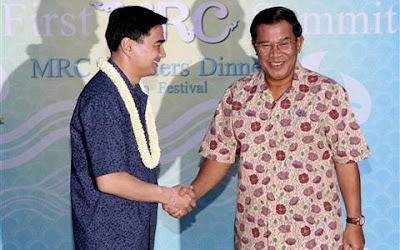Washington, D.C Thursday, 23 September 2010
via CAAI
Photo: AP
Thailand's Prime Minister Abhisit Vejjajiva, left, greets Prime Minister Hun Sen during their meeting in Hua Hin, Thailand, on April 4, 2010.
Thailand's Prime Minister Abhisit Vejjajiva, left, greets Prime Minister Hun Sen during their meeting in Hua Hin, Thailand, on April 4, 2010.
“No concessions. Not even in the area of Preah Vihear temple. We've taken the decision of the Hague and implemented it. The formal map that the court made was part of the border treaty of 1904. So how can we bargain? We are not boundary sellers.”
Prime Minister Hun Sen is expected to meet his Thai counterpart during meetings in New York this weekend, but experts and members of the opposition say he must be careful not to give concessions to Thailand over a contentious border issue.
Hun Sen is in New York to meet with Asean leaders and top US officials, and his meeting with Thai Prime Minister Abhisit Vijjajiva will be the first in nearly a year.
But the talks are coming before Thai parliament has approved discussions between a joint border commission seeking to resolve the border row, in which both sides claim ownership of a small strip of land near Preah Vihear temple.
Clear border demarcation cannot take place without the approval of three sets of meeting minutes from the border committee by Thai parliament.
“Concessions are not possible,” said Sean Pengse, president of the Border Committee in France, a group that advocates for Cambodian border integrity. “We've lost a lot to Thailand, such as Phnom Chart and other mountains they have already taken. What are we going to concede?”
If Cambodia gives up land, such as the Ta Moan temples of Oddar Meanchey province, he said, “it is going to be endless.”
Meanwhile, Cambodia is in a strong position and should find a way to end the conflict soon, through the Paris Peace Accords and the International Court of Justice, which can clarify for Thailand where the border should be, he said.
The International Court ruled on Preah Vihear temple in 1962, and its decision could be used to further clarify claims of land nearby, he said. Thailand disputes ownership of 4.6 kilometers of land west of the temple.
“Not to complain to the court again, but to ask the court to additionally clarify, that's all,” Sean Pengse said.
Cambodia says Thailand is using a unilateral map of the area for its land claims and is ignoring an international map that was even recognized by previous Thai governments.
While both sides are still trying to lay down markers on certain parts of the border, the latest dispute stems back to the July 2008 inscription of Preah Vihear temple on Unesco's World Heritage list, which sparked national furor in Thailand and led to a military build-up on both sides.
Talks failed to completely diffuse the subsequent tension, as Thailand accused Cambodia of violating a 2000 agreement and Cambodia maintained the border issue had been politicized by a Thai government in crisis.
Kem Sokha, head of the minority opposition party, said by phone from the US that Hun Sen has made his position clear and should now seek a solution, without giving up ground.
“I don't want to see additional losses to Cambodian land because of concessions,” he said. “We should take the principle of law and the internationally recognized map.”
Var Kim Hong, who is the head of Cambodia's border committee, said the government would not compromise.
“No concessions,” he said. “Not even in the area of Preah Vihear temple. We've taken the decision of the Hague and implemented it. The formal map that the court made was part of the border treaty of 1904. So how can we bargain? We are not boundary sellers.”
Nevertheless, a senior Cambodian general who spoke on condition of anonymity said Thailand has intruded across the Cambodian border, between 100 meters and a kilometer in multiple areas along the northern frontier. Thailand could gain occupied ground through bilateral deals and will therefore be unlikely to seek a multilateral solution, he said.
Var Kim Hong would only acknowledge that there are “controversial” sites that need clarification through demarcation, once joint border committee work renews.
“We are working on the issue,” he said, adding that it's “impossible” to say in some places where the border lies.

No comments:
Post a Comment